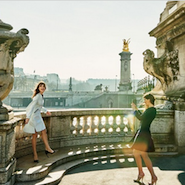- About
- Subscribe Now
- New York,
May 1, 2015

 Travel + Leisure updates for the modern reader
Travel + Leisure updates for the modern reader
NEW YORK – Affluent consumers are increasingly ready to purchase luxury products, providing brands give them plenty of information and appeal to global trends, according to an executive from YouGov at the Luxury Insights Summit 2015 April 29.
A number of trends have become apparent as global affluents recover from the recession and return to purchasing luxury products. Brands can harness these trends to appeal to the new global consumer.
“Where we’ve landed through this 10 year journey, we’ve gone from this blind consumption before the recession to this era of enlightened choice,” said Cara David, managing partner of YouGov, New York. “It’s a journey from awareness to understanding.
“In 2007 the majority of our shoppers were traditionalists," she said. "They were shopping for brand, they were shopping for the bag and the badge, and they weren’t really giving a lot of consideration to price.
“Today affluent people have high expectations for themselves to do better than that. They have high expectations for themselves in terms of their own understanding of the product.”
Luxury Insights Summit 2015 was organized by Luxury Daily.
Face the changes
Four trends that were highlighted in YouGov’s report include a move towards a global affluent world, a change in consumers’ purchasing post-recession, the importance of discretion and an increase in enlightened choices.
Ms. David spoke at the Luxury Insights Summit 2015 on April 29
The top 10 percent of consumers are becoming more globalized and less tied to their particular country of origin. Affluents reported feeling intimate ties with others in their economic class regardless of nationality.
Brands must consider this new global economy when creating marketing strategies. It is important for marketing campaigns to appeal to consumers around the world and to target a particular economic bracket as opposed to individual countries.
Affluents have an increasingly global perspective
This is a time for optimism, however, as consumers reported feeling it is the time to begin making luxury purchases now that they have fully recovered from the recession. Polls indicated that consumers are eager to spend more on luxury items in the coming year, and data supports this trend.
Despite this increase in consumption, consumers are more discerning than they were before the recession, and they require brands to cater to them in new ways. Contemporary consumers are less ostentatious than consumers before the recession, and one of the key motivating factors in choosing luxury products was discretion.
Consumers value discretion above other qualities
Consumers do not want to be labeled as ultra affluent as they feel this could put them in danger physically, as terrorist groups target the wealthy, or emotionally as there is now a stigma against excessive spending. Affluents are spending more on experiences that will bring them closer to loved ones than products that will draw attention from strangers.
Finally, consumers have more information at their fingertips thanks to the increase in smartphones and other mobile devices. Consumers now seek detailed information from the brands themselves in order to make more enlightened purchases.
All of these trends present a new consumer who is eager to purchase luxury products with a more educated and reserved mentality. It is important for brands to cater to these traits and mature with consumers in the post-recession economy.
Information is important to more enlightened luxury consumers
State the facts
As a result of the recession and the increase in mobile technology, the relationship between brands and consumers has changed drastically in recent decades. Technology and the Internet have fundamentally changed the retail landscape forever, resulting in six major shifts that can now be identified, according to an author at the Columbia Business School Retail & Luxury Goods Conference March 27.
The world has become increasingly high-tech and high-touch, leading to a new focus on connecting with the consumer at the front end of the supply chain. This requires brands to cater to new millennial consumers by providing them with high quality experiences wherever and however they want (see story).
Despite these significant changes, some aspects of the luxury industry remain the same. Although the market is changing, there are still a few fundamental truths about the modern luxury consumer, according to a Four Seasons senior executive at Luxury FirstLook: Strategy 2015 Jan. 13.
The landscape of the luxury market is fragmented as a result of a shift from scarcity to abundance, omnichannel marketing strategies and a new type of consumer. By maintaining commitment to the few observable consistent consumer traits, brands will be better able to target the individuals who purchase their products (see story).
Fully understanding what aspects of the market will change and what will stay the same is important for any brand developing its marketing strategies. The trends described in YouGov’s recent report provide insight into the latest consumer behavior.
“People approach purchasing like they do investments,” Ms. David said. “It’s an investment strategy.
“Understanding that can help you get a percentage of this increase that we’re going to see this year. It’s important for you to be able to convey the details that make the value proposition for the consumer.”
Final Take
Kay Sorin, editorial assistant on Luxury Daily, New York
Share your thoughts. Click here